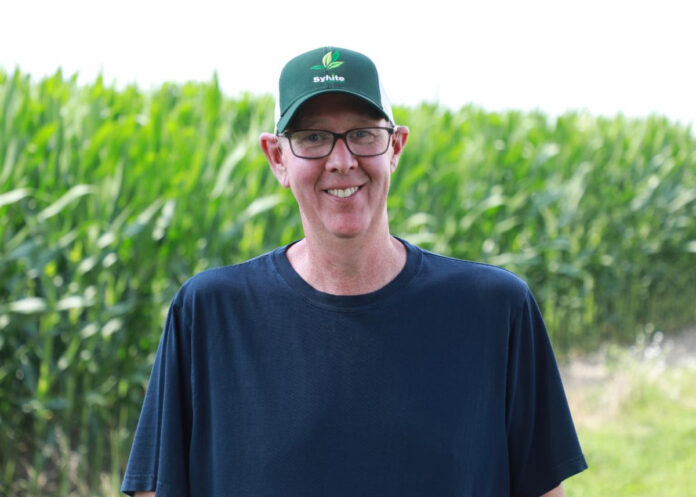By Rebecca Hannam – Ontario Soil & Crop Improvement Association – Special to the Sydenham Current
A Y-drop system on a hi-boy sprayer is helping a Dresden area farmer optimize nitrogen application and reduce greenhouse gas emissions.
Greg Devries, who owns and operates Cedarline Farms with his family, applied for cost-share funding through the Ontario On-Farm Climate Action Fund (OFCAF) after seeing others use a Y-drop system.
“Corn is a very expensive crop to grow and fertilizer has been very expensive, so we’re trying to utilize as much of the nutrients as possible,” he says. “We’re not actually putting any more nitrogen on when it comes to using the Y-drops, but we’re putting it on in the areas that have the best productivity.”
The system, which attaches to the sprayer boom and connects to the distribution system so the liquid can be applied directly to the base of the plant, allows Devries to apply nitrogen into standing corn later in the season than under his previous program. He continues to strip-till and apply nitrogen at planting, with the goal of having 80 to 100 pounds of nitrogen applied per acre by the time the crop has matured.
“We can appraise what the situation looks like when it comes to putting the Y-drop in when the corn is anywhere shoulder-high or a little bit lower, and we can apply what we call the right rate,” he explains, noting that the fertilizer rate prescriptions are based on how much the crop has utilized so far in a season as well as eight years of farm performance data.
Meeting with peers to discuss nitrogen management and share best management practices at a Knowledge Sharing Event helped Devries to plan and implement the project. He believes gathering and sharing information is one of the most important things farmers can do. “There’s a lot we don’t know about nitrogen and we need to spend some time and energy as an industry and farming community to see what we can do better”, he says.
The overall goal at Cedarline Farms is to be successful and sustainable by protecting the environment and enriching the soil. Improving nitrogen efficiency reduces greenhouse gas emissions, which is one of the ways farmers can tackle climate change.
“We’re hopeful that as we move forward we’re still going to see better and better results on the yield side of things, but we’re also hopeful that we can actually decrease the amount of 28 per cent nitrogen that we do apply to our crop,” Devries says. “As farmers we have a responsibility to maintain the environment that we grow our crops within, and I think this is just another tool in our toolbox to achieve that.”
Funded by Agriculture and Agri-Food Canada, the OFCAF supports farmers to implement best management practices to tackle climate change through reducing emissions of greenhouse gases and supporting increased carbon sequestration. In Ontario, it is delivered by the Ontario Soil and Crop Improvement Association (OSCIA).
Funded by Agriculture and Agri-Food Canada, the OFCAF supports farmers to implement best management practices to tackle climate change through reducing emissions of greenhouse gases and supporting increased carbon sequestration. In Ontario, it is delivered by the Ontario Soil and Crop Improvement Association (OSCIA).
















